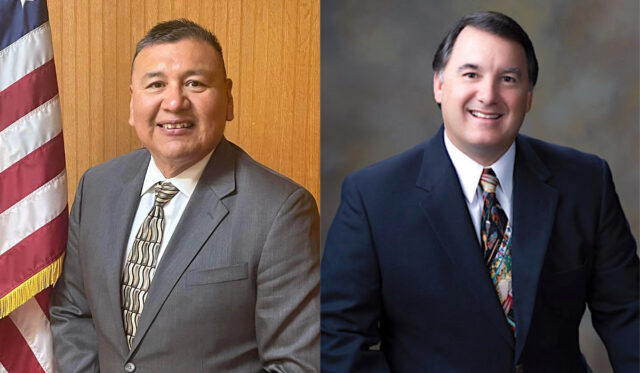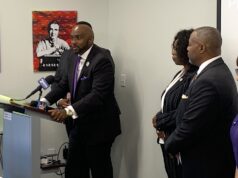

When he filed for office, Dusk Monetathchi was hopeful, but he didn’t exactly expect to be in his current position, forcing longtime incumbent Steven Woods into a surprise runoff for the Tishomingo District’s third seat on the Chickasaw Nation’s Tribal Legislature.
Chickasaw elections are conducted exclusively through absentee ballots, which need to be received in the Chickasaw Nation Election Commission’s U.S. Post Office box no later than 10:30 a.m. Tuesday, Aug. 29, to be considered valid.
Woods almost won reelection outright in the July 25 general election, getting 729 votes (49.6 percent) to 653 (44.4 percent) for Monetathchi. The three-candidate race also included Shane Langford, who received 89 votes (6 percent). Had Woods received only seven of the votes divided between Monetathchi and Langford, he would have prevailed with a majority.
Woods did not respond to multiple calls and messages seeking an interview ahead of Tuesday’s Chickasaw runoff election. Monetathchi, whose law enforcement career was highlighted in a 2014 profile by a member of the Chickasaw Nation’s media relations team, did agree to an interview and said he was surprised that the race has gone to a runoff.
“I’m not really a politician. My background is in the church, mainly ministering and law enforcement, and so I don’t have a lot of experience with campaigns and running for office,” Monetathchi said. “We’re running the campaign off a household budget, so given all of that, I guess I was surprised.”
Monetathchi said he decided to run in part because of the McGirt v. Oklahoma U.S. Supreme Court decision and what it means in terms of the Chickasaw Nation expanding its criminal justice system to prosecute more cases on its affirmed reservation.
“I’ve had a background in law enforcement, and given the events that have unfolded with the McGirt decision and tribal laws, I just think I have some good ideas when it comes to prosecuting crimes and how that should be done after that decision,” he said.
The decision also came from his own life experiences.
“In my heart, and this is just my opinion, but if I’m elected I will represent the people that live here and the at-large areas, and just having been in contact with so many people through my job and the church ministry, it’s made me want to bring information back to the people,” Monetathchi said. “I don’t claim to be an expert on everything, but I just have a heart for people and serving.”
Monetathchi said he sees valuing tribal sovereignty as among the most important issues in this month’s election. He said the Chickasaw Nation’s government has done a good job protecting its sovereignty, something he would like to continue.
“I’m big into sovereignty,” he said. “I believe that must continue to be upheld as much as it can. My uncle was a tribal legislator many years ago, and when we lost our sovereignty, we were unable to govern our people. That’s invaluable, and it needs to be fought for. I think we’ve done a great job progressing. It isn’t perfect, but we have progressed.”
Among his biggest priorities if elected would be to assist elders with their needs.
“One of the things I’d like to work toward is improving the programs that assist our elders,” he said. “Especially with things like energy. In this economy, with the inflation we are all experiencing, those services need to be improved. Energy costs and food costs have all gone up.”
Asked about recent criticism of the Chickasaw Tribal Legislature, Monetathchi said he is unsure whether his tribe’s government is adequately transparent. But he said he has studied the Chickasaw Nation Constitution.
“I can’t really claim to know everything I need to know to answer that,” he said. “If I’m elected, I know that I will be transparent. I have read up on the Chickasaw Constitution, and I will be bound by that.”
Unlike some other tribes, the Chickasaw Nation does not employ term limits, and elected officials may serve an unlimited number of consecutive terms.
Woods is well known to Chickasaw citizens, having served in the Legislature for two decades. He brings plenty of experience on issues facing the Chickasaw Nation and its government.
Currently, Woods serves on a number of legislative committees, including human resources, hunting, fishing and land management, legislative, education and finance, according to the Chickasaw Nation’s legislative website.
Woods also served on the Chickasaw Nation Supreme Court from 1991 to 2002.
On his Facebook page, Woods said that, if elected to another term, he would continue to promote economic development in order to provide more jobs for members so they can become self-sufficient. He said he would also expand the existing court system and work to incorporate the traditions and customs of the Chickasaw people.
Woods said he would also expand health care access to elders and work to promote the preservation of Chickasaw history, culture and language.
“I’m excited to talk about our achievements in the Tishomingo District,” he said in a Facebook message to supporters. “Over the years, I have been committed to expanding at-large opportunities, promoting tribal economic development, and creating jobs for our community. We’ve also worked hard to enrich our culture and provide enhanced educational programs for Chickasaw students. With your support, we can continue making progress and ensuring a brighter future for all Chickasaws.”
The Chickasaw Nation is headquartered in Ada, and its reservation spans 7,648 square miles across 13 counties in southern Oklahoma.




















